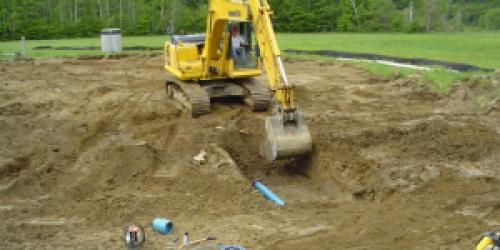The Engineering and Water Resources Program assists owners, operators, town officials, consultants and well drillers in areas pertaining to drinking water source(s) and engineering infrastructure of Public Drinking Water Systems.
The Engineering and Water Resources Program uses a multi-barrier approach to protect public drinking water quality in Vermont, proactively managing potential threats all the way from the source to the tap. Through permitting, plan review, and loan programs, the Engineering and Water Resources Program ensures the use of best practices at the following steps of drinking water system development and maintenance:
- Source Water Permits - Selecting the best available drinking water source;
- Source Water Protection - Protecting the drinking water source from contamination;
- Construction Permits - Using effective water treatment and preventing water quality deterioration in the water distribution system.
Public Drinking Water Systems in Vermont are supplied by either surface water or groundwater. Each water source must meet certain water quality and quantity criteria as defined by Chapter 21, Water Supply Rule, to protect public health and the long-term sustainability of the water resource(s). The process of source permitting ensures that the water quality and quantity parameters are met. A Division Hydrogeologist reviews and approves source permit application materials as presented throughout this process.
To ensure long-term protection of the drinking water source(s), Public Drinking Water Systems may be required to develop a Source Protection Plan. The Plan is a tool intended to be used proactively by the Public Drinking Water Systems to safeguard, maintain, and improve the quality and quantity of the source(s) and their contributing areas. These strategies may depend on the type of source being protected (e.g., groundwater, reservoir, or river).
Raw water from the source is passed through a treatment facility, and the product (finished water) is stored and conveyed to users through a combination of infrastructure (e.g., pumps, storage, distribution pipes). The design of drinking water treatment and infrastructure must meet standards as defined by Chapter 21, Water Supply Rule. Before construction can begin, a Division Engineer reviews and approves a Drinking Water Construction Permit to ensure compliance with these standards.
Low-cost financing to eligible Public Drinking Water Systems for planning and capital improvement to improve public health protection and facilitate compliance with Chapter 21, Water Supply Rule is available through the Drinking Water State Revolving Fund (DWSRF) program. Examples of projects include source development, land acquisition, water main construction or replacement, and installation of water treatment. If a Public Drinking Water System project is funded by DWSRF, the Engineering and Water Resources Program is involved in the technical review of the Planning Loan Projects - Step I, Planning and Preliminary Engineering and Source Development, and Step II, Final Design (leading to a Drinking Water Construction Permit). The work is done in close collaboration with the DWSRF program, which is responsible for the review of the financial and loan-aspects of the project.
Other activities within the Program include:
- Act 250/Section 248 support
- Cyanotoxin Monitoring
- Emerging Contaminants in Drinking Water (PFAS)
- Imported Bottled Water
- Well Driller Reporting
- Groundwater Reclassification
Guidance Documents and Technical Resources
DWGPD has developed resources to assist PFAS-impacted public drinking water systems and understand treatment:
- PFAS Treatment Engineering Document
- Granular Activated Carbon (GAC) Treatment Design Checklist
- Anion Exchange (AIX) Treatment Design Checklist
The treatment document presents important considerations regarding PFAS treatment such as design and implementation, standard start up procedures, and expectations from permitting to final construction completion. The checklists are developed to streamline and expedite the design and permit to construct review process for PFAS treatment installations.
Video Resources
Drinking Water Sharing Session #8
Drinking Water Sharing Session #7
Drinking Water Sharing Session #6
Drinking Water Sharing Session #5
Drinking Water Sharing Session #4
Drinking Water Sharing Session #3
Drinking Water Sharing Session PowerPoints
Drinking Water Sharing Session - NSF 60 & AWWA C651
Drinking Water Sharing Session - Polycyclic Aromatic Hydrocarbons (PAHs)
Drinking Water Sharing Session Resources
Linear Construction Projects Guidance Document
Bipartisan Infrastructure Law (BIL) State Revolving Fund (SRF) Q&A



